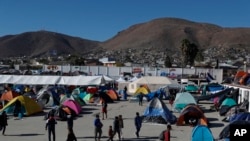Tuesday is International Migrants Day, and the head of the U.N. Migration Agency is urging nations to drop their negative perceptions of migrants and to treat them with dignity, respect and as a benefit to their societies.
When the United Nations proclaimed December 18 as International Migrants Day in 2000, around 150 million people were on the move. Now, 18 years later, that number has grown to an estimated 258 million.
Many people migrate to other nations for economic reasons, because they are desperately poor, are running from violence or are imbued with a sense of adventure and entrepreneurship. The United Nations reports another 40 million people are internally displaced by conflict.
International Organization for Migration Director General Antonio Vitorino says many people do not wish to leave their homes, but are compelled to do so by circumstances out of their control. For example, he says every year millions of people are forced to leave by climate-related disasters and natural hazards.
His spokesman, Joel Millman, says IOM chief Vitorino notes the mere act of migration exposes many people to great dangers.
“IOM’s data show that close to 3,400 migrants and refugees have already lost their lives worldwide in 2018. Most died trying to reach Europe by sea; many others perished attempting to cross deserts or pass through dense forests seeking safety far from official border crossings. These numbers, compiled daily by IOM staff, shame us,” he said.
This year’s observance of International Migrants Day comes one day ahead of the formal endorsement at the U.N. General Assembly of the Global Compact for Migration. The compact was overwhelmingly adopted by most nations in the world earlier this month in Marrakech, Morocco. Major holdouts include Australia, the United States, Hungary, Italy, Austria and Poland.
Vitorino sees the agreement as an important step toward providing the dignity owed to migrants. He says it also creates a space wherein a more balanced discourse and widespread cooperation on migration can take place.
He says the compact stresses the need for all states to have well-managed migration. He adds no one state alone can achieve this. He says cooperation at all levels is fundamental to addressing migration.






